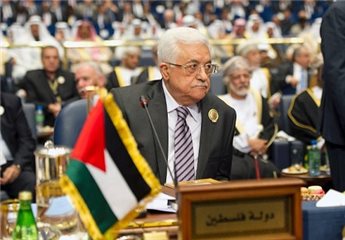President Mahmoud Abbas said, at an Egyptian-hosted Arab summit on Saturday, that the Palestinian relationship with Israel cannot continue as it has in recent years.Speaking at the 26th Arab summit, which convened in the Egyptian town of Sharm el-Sheikh on Friday, Abbas said that Israel had taken over the Palestinian Authority’s powers and responsibilities, citing in particular the confiscation of Palestinian tax revenues.
He said: ‘We have decided to re-evaluate our economic, political and security relationship with Israel, and will be holding elections as soon as possible.’
Speaking against ‘normalizing relations with Israel,’ he said: ‘We are looking forward to activating an Arab financial security net.’
Israeli authorities said on Friday that they would be releasing hundreds of millions of dollars in tax funds they had been withholding from the Palestinian Authority as a punitive measure for joining the International Criminal Court.
See: Palestine to Join ICC on April 1st
However, they did not confirm whether they would be resuming the normal monthly payment of around $127 million in customs duties, and Palestinian authorities have reacted cautiously to the news.
The president used his speech to warn of a possible future in which the West Bank and the Gaza Strip become separate states, leaving Jerusalem and the Palestinian refugee crisis forgotten, adding that he hoped the summit would condemn and refuse any proposals that might lead to such a scenario.
Abbas said that it would not be long before Israel’s annexation of East Jerusalem was complete.
Despite the reconciliation government between Fatah and Hamas, he also said that the main obstacles to the reconstruction of Gaza were set by Israel on one side and Hamas on the other.
Abbas also offered Palestinian support for the Saudi-led Arab coalition ‘designed to maintain the unity of Yemen.’
Egyptian President Abdel Fattah al-Sisi is hoping to use the backdrop of operations in Yemen to create a joint Arab military force to potentially combat militants hostile to his regime, in Libya and the northern Sinai.
Fourteen Arab presidents, kings, and emirs were in attendance at the summit which will continue through to Sunday and will ultimately address 11 issues, largely dominated by discussions on the creation of a joint Arab force, but also including the Palestine-Israel conflict and recent developments in Syria, Libya and Yemen.
The Palestinian Minister of Foreign Affairs Riyad al-Maliki earlier told Ma’an that the objectives of the summit were the clearest in 40 years, not only regarding military operations in Yemen, but also support for the Palestinian cause.
Sisi, earlier on Saturday demanded an end to the Israeli occupation of Palestinian land in accordance with past international resolutions, in particular citing the 2002 Arab Peace Initiative.
The Emir of Kuwait Sabah al-Ahmad al-Sabah also said that the Palestinian cause was a priority for Arabs.
The peace initiative in 2002 was approved at an Arab Summit in Beirut and offered normalized relations between Israel and the Arab world in exchange for withdrawal from the occupied territories, including Jerusalem, and a ‘just settlement’ for the Palestinian refugee crisis.
Ahead of last year’s summit in Kuwait, officials told Ma’an that Arab envoys were considering withdrawing the Arab Peace Initiative, but to date it remains the most comprehensive proposal.
See also Abbas: Negotiations with Israel ‘Still On The Table’

